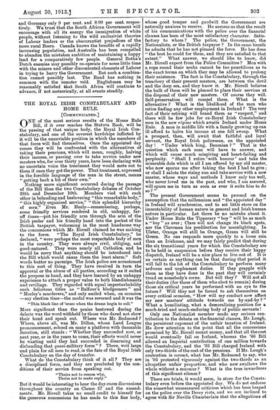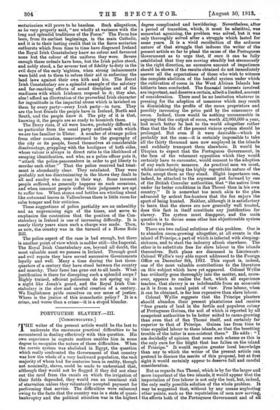THE ROYAL IRISH CONSTABULARY AND HOME RULE. [CommuNrcATED.] O NE of
the most serious results of the Home Rule Bill, if it ever reaches the Statute Book, will be the passing of that unique body, the Royal Irish Con- stabulary, and one of the severest hardships inflicted by it will be the unenviable position in which the members of that force will find themselves. Once the appointed day comes they will be confronted with the alternatives of taking their pensions, which will mean, roughly, halving their income, or passing over to take service under new masters who, for over thirty years, have been declaring with no uncertain voice the treatment they would mete out to them if once they got the power. That treatment, expressed in the forcible language of the man in the street, means " getting back a bit of their own." Nothing more significant occurred during the passage of the Bill than the two Constabulary debates of October 28th and December 10th. Members vied with each Other in belauding and beslavering "this remarkable body," " this highly organized service," " this splendid hierarchy of men." Even Mr. Healy—remembering, perhaps, some friendly services rendered in old, unhappy, far- off times—put his friendly arm through the arm of the Irish peeler and his friendly hand into the pocket of the British taxpayer, welcoming in the most handsome way the concessions which Mr. Birrell claimed he was making to the force. " The Royal Irish Constabulary," he declared, " were perhaps the most respectable body of men in the country. They were always civil, obliging, and good-natured. They were nearly all Catholics, and he would be sorry that anything should be introduced into the Bill which would cause them the least alarm." Soft words butter no parsnips. The Irish police are accustomed to this sort of thing. They have received in turn the approval or the abuse of all parties, according as it suited the purpose in hand, and they have learned by an unhappy experience to attach a proper value to both blandishments and revilings. They regarded with equal imperturbability such felicitous titles as " Balfour's bludgeoners " and " Morley's murderers," and only smiled when, on occasion —say election time—the medal was reversed and it was the "Thin black line of 'eroes when the drums begin to roll."
More significant than the praise bestowed during the debate was the word withheld by those who dared not show their hand and speak out. Where was Mr. Redmond ? Where, above all, was Mr. Dillon, whose Land League pronouncement, echoed on many a platform with damnable iteration, still stands : " Whether they succeeded now, or next year, or in the years to come, their efforts would never be wanting until they had succeeded in disarming and disbanding that quasi-military force " ? There, writ large and plain for all men to read, is the fate of the Royal Irish Constabulary on the day of transfer. , What do the Constabulary think of it all ? They are a disciplined force, and they are precluded by the con- ditions of their service from speaking out.
"Theirs not to reason why, Theirs not to make reply."
But it would be interesting to hear the day-room discussions throughout the country on Clause 37 and the amend- ments. Mr. Birrell takes no small credit to himself for the generous concessions he has made to this fine body, whose good temper and goodwill the Government are naturally anxious to receive. He assures us that the result of his communications with the police over the financial clauses has been of the most satisfactory character. Satis- factory to whom ? The police, the Government, the Nationalists, or the British taxpayer ? In the same breath he admits that he has not pleased the force. He has done " the best be could for them, and they are satisfied to that extent." What answer, we should like to know, did Mr. Birrell expect from the Police Committee ? Men with a rope round their necks cannot be too punctilious as to the exact terms on which they may be allowed to prolong their existence. The fact is the Constabulary, through the treachery of their present masters, are between the devil and the deep sea, and they know it. Mr. Birrell believes the bulk of them will be pleased to place their services at the disposal of their new masters. Of course they will. Self-preservation will compel them. What is the alternative ? What is the likelihood of the men who retire finding any other employment in Ireland ? The very fact of their retiring will brand them as "suspect," and there will be few jobs for ex-Royal Irish Constabulary men in the new regime which awaits Ireland under Home Rule. A man in middle life with a family growing up can ill afford to halve his income at one fell swoop. What a prospect, then, will await that faithful and loyal servant, the Royal Irish policeman, on the appointed day ! " Under which king, Bezonian ? " That is the question which each man will have to answer, and which will cause much misgiving and heart-failing and perplexity. " Shall I retire 'with honour' and take the miserable dole which is all I am offered by my old master, who now spurns me after taking the best I had to give ; or shall I salute the rising sun and take service with a new master, whose ways and methods I know only too well, who never loved me in the past, and who, I am assured, will spurn me in turn as soon as ever it suits him to do so ? "
The present Government seems to proceed on the assumption that the millennium and " the appointed day " in Ireland will synchronize, and to set little store on the immutability of human nature in general and Irish human nature in particular. Let there be no mistake about it. Under Home Rule the Tipperary " boy " will be as much a " boy " as ever ; Clam will not change its black spots, nor the Clareman his predilection for moonlighting. In Ulster, Orange will still be Orange, Green will still be Green. No one responds more quickly to a loose rein than an Irishman, and we may fairly predict that during the six transitional years for which the Constabulary are to be held in suspension before they receive their happy dispatch, Ireland will be a nice place to live out of. It is as certain as anything can be that during that period it will fall to the lot of the Constabulary to perform many arduous and unpleasant duties. If they grapple with them as they have done in the past they will certainly tread on somebody's corns. But will they ? Will not all their duties (for those of them who elect to remain) during those six critical years be performed with an eye to the future ? Will they not be forced to ask themselves on every critical occasion, " How will my conduct now affect my new masters' attitude towards me by-and-by ? " What a humiliating, what a demoralizing position for a much-tried and much-enduring body of public servants !
Only one Nationalist member made any serious con- tribution to the debate on the financial clauses, Mr. Lough, the persistent exponent of the unfair taxation of Ireland. He drew attention to the point that all the concessions promised by Mr. Birrell meant money, and that all the cost would eventually fall on Ireland, whereas the '86 Bill allowed an Imperial contribution of one million towards the Constabulary, and the '93 Bill charged Ireland with only two-thirds of the cost of the pensions. If Mr. Lough's contention is correct, what has Mr. Redmond to say, who in '93 protested vigorously against the two-thirds as an altogether unfair proportion, and who now swallows the whole without a murmur ? What is the true inwardness of this significant silence ?
There are trials, it would seem, in store for the Consta- bulary even before the appointed day. We do not endorse the somewhat unmeasured criticism which has been heaped on the police over the Derry riots, and we are inclined to agree with Sir Neville Chamberlain that the allegations of sectarianism will prove to be baseless. Such allegations, as he very properly said, " are wholly at variance with the long and splendid traditions of the Force." The Force has been, from its earliest beginnings, in the main Catholic, and it is to their lasting credit that in the fierce sectarian outbursts which from time to time have disgraced Ireland the Royal Irish Constabulary knew no colour and favoured none but the colour of the uniform they wore. Severe enough these ordeals have been, but the Irish police stood, and nobly stood, a far severer test of fidelity to duty in the evil days of the early 'eighties, when strong inducements were held out to them to refuse their aid in enforcing the land laws against their own kith and kin. The Royal Irish Constabulary are a splendid example of the salutary and far-reaching effects of sound discipline and of the readiness with which Irishmen respond to it; they also, alas ! afford an illustration of the proverbial Irish character for ingratitude in the impartial abuse which is lavished on them by every party—every Irish party—in turn. They are the best friends the people have in Ireland, North and South, and the people know it. The pity of it is that, knowing it, the people are so ready to besmirch them. The Derry riots, if all were known, probably differed in no particular from the usual party outbreak with which we are too familiar in Ulster. A number of strange police from other counties, unaccustomed to the geography of the city or its people, found themselves at considerable disadvantage, grappling with the hooligans of both sides, whose valour is always in direct ratio to the likelihood of escaping identification, and who, as a police officer puts it, " attack the police-peacemakers in order to get liberty to murder each other." That the police received bad treat- ment is abundantly clear. They retaliated. They were probably not too discriminating in the blows they dealt to all and sundry who came in their way. Some innocent people suffered, as generally happens on such occasions, and when innocent people suffer their judgments are apt to suffer too. When stones and bottles are whirling about like autumnal leaves in Vallombrosa there is little room for calm temper and fair criticism.
These suggestions of police partiality are an unhealthy and an unpromising sign of the times, and serve to emphasize the contention that the position of the Con- stabulary in Ireland is one of increasing difficulty. It is nearly thirty years since such a charge was made. Then, as now, the country was in the turmoil of a Home Rule Bill.
The police aspect of the case is bad enough, but there is another point of view which is sadder still—the Imperial. The Royal Irish Constabulary are, beyond all doubt, the most valuable asset we possess in Ireland. Through good and evil repute they have served successive Governments loyally and well. Many a time during the last three- quarters of a century they have stood between the country and anarchy. Their fame has gone out to all lands. What justification is there for disrupting such a splendid corps ? Highly trained, efficient policemen do not spring up in a night like Jonah's gourd, and the Royal Irish Con- stabulary is the slow and careful creation of a century. We Englishmen pride ourselves on our sense of justice. Where is the justice of this iconoclastic policy ? It is a crime, and worse than a crime—it is a stupid blunder.



































 Previous page
Previous page